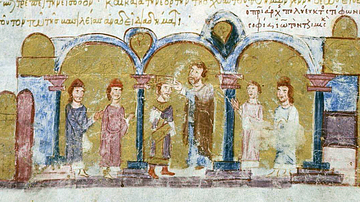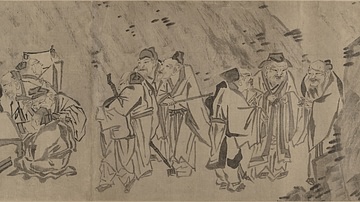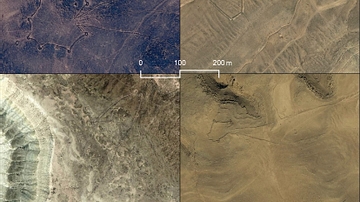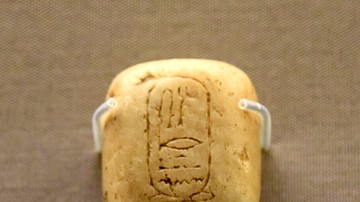Search
Search Results

Definition
John I Tzimiskes
John I Tzimiskes was Byzantine emperor from 969 to 976 CE. Although he took the throne by murdering his predecessor Nikephoros II Phokas, John was a popular emperor. A skilled general and a competent politician, he is known for expanding...

Definition
Teng Shih
Teng Shih (l. c. 500 BCE) was a Chinese Sophist and lawyer who lived and wrote in the province of Cheng (Pengcheng, modern-day Xuzhou, Jiangsu province) during the era of the Spring and Autumn Period (c. 772-476 BCE) which preceded the Warring...

Definition
Desert Kites
Desert kites are mega-constructions that consist of two long walls converging upon an enclosed space that has on its periphery small stone constructions called cells. Seen from the sky, their shape suggests that of a windborne kite; they...

Definition
Menelaus of Alexandria
Menelaus of Alexandria was a Greek astronomer, scientist, and mathematician who lived around 100 CE. Menelaus made a significant and lasting contribution to the fields of astronomy, geometry, and trigonometry. His major work, the Spherics...

Article
Social Structure in Ancient Egypt
The society of ancient Egypt was strictly divided into a hierarchy with the king at the top and then his vizier, the members of his court, priests and scribes, regional governors (eventually called 'nomarchs'), the generals of the military...

Article
Feudalism in Medieval Japan
Feudalism in medieval Japan (1185-1603) is the relationship between lords and vassals where land ownership and its use were exchanged for military service and loyalty. Although present earlier to some degree, the feudal system in Japan was...

Article
Who's Who in a Pirate Crew
It was all very well pocketing other people’s valuables and roistering at rum parties, but life on a pirate ship involved a surprising amount of hard work. Pirates were first and foremost sailors and in the Golden Age of Piracy (1690-1730...

Article
Trade in Ancient Egypt
Trade has always been a vital aspect of any civilization whether at the local or international level. However many goods one has, whether as an individual, a community, or a country, there will always be something one lacks and will need...

Article
Agriculture in the Fertile Crescent & Mesopotamia
The ancient Near East, and the historical region of the Fertile Crescent in particular, is generally seen as the birthplace of agriculture. The first agricultural evidence comes from the Levant, from where it spread to Mesopotamia, enabling...

Article
The Spice Trade & the Age of Exploration
One of the major motivating factors in the European Age of Exploration was the search for direct access to the highly lucrative Eastern spice trade. In the 15th century, spices came to Europe via the Middle East land and sea routes, and spices...